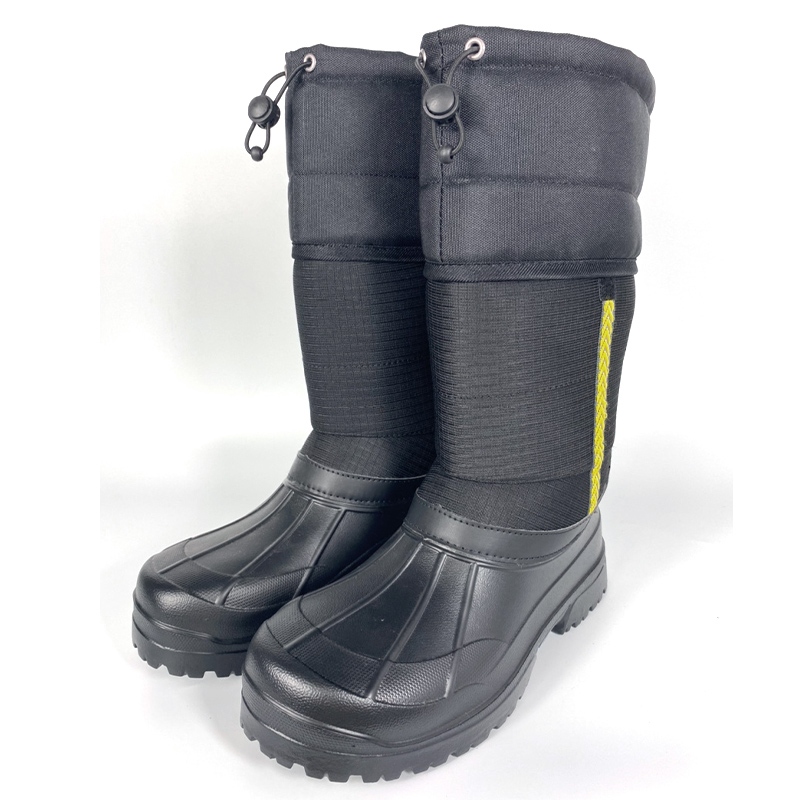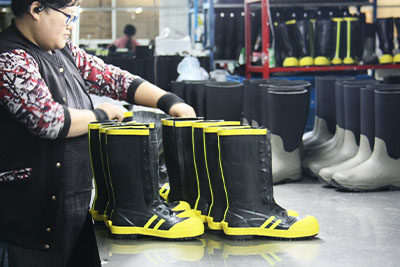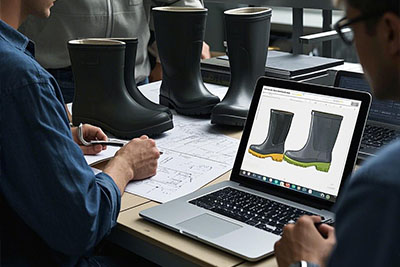What Makes PU and Fabric Collars Essential for Rubber Rain Boots?
Rubber rain boots are a must for anyone in wet weather. They help farmers in muddy fields or city folks in puddles. But for the best waterproof rain boots, one part often gets overlooked: the collar. This top part of the boot shaft can stop water from getting in. It keeps your trousers dry. If you search for “best rubber rain boots with collars,” you’re thinking right. Materials like polyurethane (PU) and Oxford fabric make collars better. They add water protection, air flow, and comfort for spring and summer rain.
What Is a Collar in Rubber Rain Boots and Why Does It Matter?
Core Design and Functionality
The collar in rubber rain boots is a flexible part stitched on the top of the shaft. It wraps around the lower leg and makes a tight seal against water. The boot body is hard and molded, usually from natural rubber or PVC. The collar is different. It bends to fit. It has a hem with an elastic string threaded through. A cord lock stopper lets you adjust it fast. This way, you can pull it tight. You tuck trouser legs inside. It blocks rain from getting in.
Historical Evolution and Modern Role
Collars started for farm and fishing work. People needed better protection in wet spots. Now, they’re a sign of good waterproof rain boots. They mix use with a bit of style. Without a collar, even tall rubber rain boots have weak spots. Water can drip down inside. This wets the lining and chills your skin. It happens more if your calves are slim. Gaps form easily. A good collar fixes this. It adds length and lets you adjust. It turns basic boots into helpers for garden work or muddy events.
Hygiene and Sustainability Benefits
Modern collars also help keep boots clean. They stop moisture from getting in. This cuts down on mold or bacteria in the lining. That’s a common problem with plain designs. For people who care about the planet, many collars use green treatments. This fits the need for eco rubber rain boots that are ethical.
Why Choose PU Collars for Your Rubber Rain Boots? A Deep Dive into Durability and Comfort

Lightweight Construction for All-Day Wear
Polyurethane (PU) collars are a smart pick for rubber rain boots. They’re light and tough. PU is a synthetic plastic. It’s molded or stuck on the boot shaft. This makes a smooth, bendy cuff. It’s about 20-30% lighter than rubber ones. This means less tired feet after long days. You can walk through wet sites or play in sprinklers without feeling heavy.
Unmatched Durability in Harsh Conditions
PU lasts a long time. A good PU collar can go three times longer than PVC or basic rubber. It fights wear, oils, chemicals, and even manure. This makes it great for farm or factory work. Unlike PVC, which cracks in cold, PU stays bendy in freezing temps. It works the same in all seasons. Water-repelling coatings make it even better against rain. It pushes drops away and stops leaks in big storms.
Breathability and Aesthetic Versatility
PU lets air through too. New types have tiny holes. They let vapor out but keep liquid water away. This stops sweaty feet in humid weather. It’s good for people who are active. PU collars come in many colors and finishes. From plain black to bright ones, they look good with jeans or work pants. So, useful rubber rain boots can be stylish too.
Proven Performance in Testing
Tests show PU boots let in 70% less water in heavy rain setups. This keeps feet and legs dry. For people who want long-lasting and easy boots, PU collars are a good upgrade. They don’t cost too much.
The Advantages of Oxford Fabric Collars in Waterproof Rain Boots: Breathability Meets Toughness

Textile Innovation for Hybrid Performance
For a fabric feel, Oxford collars use woven nylon or polyester. They have waterproof layers for mixed use in rubber rain boots. Oxford has a basket-weave look. It’s light and soft against skin. It feels like good socks.
Superior Airflow and Water Resistance
The best part is air flow. The open weave lets air move well. It pulls sweat away and stops the hot, sticky feeling in humid times. This is key for spring and summer rubber rain boots. With PU or silicone coats, it blocks water fully. It lets vapor out but keeps rain off. It works like Gore-Tex. This makes Oxford collars great for long wear in changing weather, from misty mornings to afternoon rains.
Durability and Easy Maintenance
Oxford fights tears and pokes. Its tight weave holds up better than thin fabrics. It doesn’t fray at seams. Cleaning is simple. Wipe with mild soap to make it look new. This makes waterproof boots last longer.
Style and Practical Applications
Oxford gives a neat, casual look. It comes in patterns or solid colors. It matches jeans or work pants. This makes rubber rain boots look nice, not just useful. For hiking or gardening, people like Oxford collars. They balance protection and air. Users say fewer hot spots and more comfort all day. If you need boots that do many jobs, Oxford fabric does it without weight or stiffness.
Spring and Summer Ready: Embracing Cooler Materials for Warmer Wet Days
Overcoming Heat in Traditional Designs
When it gets warm, thick rubber can make rubber rain boots feel like sweat boxes. Now, “cooler” collars help. These are simple PU and Oxford types made for in-between seasons. They skip thick layers like neoprene for lighter, airier designs.
PU and Oxford for Seasonal Flexibility
PU coolers use air-mixed plastics for better bend and less bulk. They’re good for light rain when heavy winter boots feel too much. Oxford takes air flow further. It often has mesh parts for the best circulation. It fights humidity without losing water protection. Both have anti-mold treatments for damp storage. This is a summer must.
Real-World Comfort Gains
Tests show up to 40% better heat comfort in these designs. This means drier, happier feet during puddle jumps or yard work. For families or gardeners, cooler collars make rubber rain boots work for April rains to July storms.
How the Elastic String and Stopper Enhance Boot Functionality
The Mechanics of Adjustment
The elastic string and stopper are the collar’s quiet helper. A stretchy cord, often polyester-covered latex, goes through the hem. A spring toggle or cord lock holds it without slipping. Pull to tighten for a custom fit. Squeeze to let go. This fits different calf sizes. It keeps no gaps for water, even when you walk.
Longevity and Practical Use
Stoppers made of plastic or metal don’t rust. They handle thousands of pulls. In real life, it lets you tuck trousers easily. This is a lifesaver in windy storms.
Benefits of Collars in Heavy Rain: Superior Protection for Trousers and Beyond
Heavy rain shows boot weak spots. But collared rubber rain boots do better. They guide water away from openings. Tucking legs inside stops wetting. This saves the lining and cuts smells. Tests show 70% less water getting in. This helps wet-weather workers do more.
Comparing Rubber Rain Boots With and Without Collars: A Clear Winner
Boots without collars fail in big rains. Splashes soak socks. Collared ones, especially PU or fabric, add use and last longer. They’re worth the 10-20% extra cost.
Maintenance Tips for PU and Fabric Collars: Keep Them Storm-Ready
Care for PU Collars
For PU: Rinse after use with warm soapy water. Air-dry in shade to stop cracks.
Care for Fabric Collars
For fabric: Wash in machine on gentle cold cycle. No bleach. Spot-clean stains. Check strings each month. Store upright in cool places.
Conclusion: Upgrade to Collars That Conquer Any Rain
PU and fabric collars change rubber rain boots. They mix protection, comfort, and style for wins in any wet weather.
Ready to elevate your line? Trenboo excels in custom vulcanized rubber rain boots with bespoke PU and fabric collars. Boasting 60+ years of ODM/OEM prowess, we deliver full customization—from elastic stoppers to seasonal adaptations—for EU-compliant excellence. Our 20,000㎡ facility churns out 150,000 pairs monthly, shipping to 50+ nations under ISO9001 and BSCI standards.
Business partners: Collaborate for unique, high-performing designs. Reach us at +8618633619747 or yori@wellies.cn—let’s build rain boots that rain praise.









